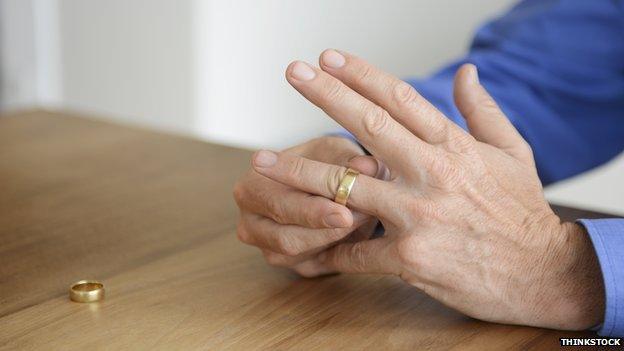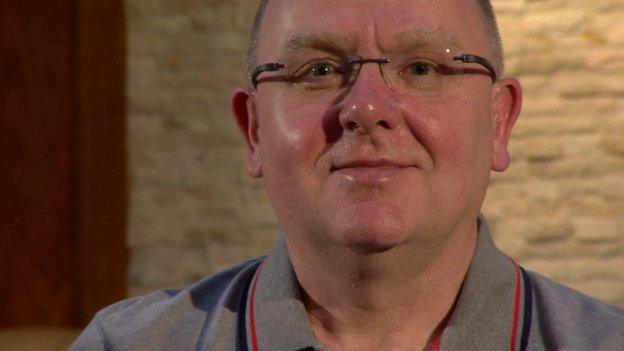'I'm a gay man but married a woman'
- Published

Decades ago when gay people faced ostracism and the threat of prosecution in the UK and other Western nations, many chose to marry and disguise their sexuality. But even with increased tolerance now some choose to take the same path.
Nick, who is in his 50s, has been married to his wife for 30 years. He is also gay.
He thinks his wife had suspicions about his sexuality for years, but things came to a head when he had an affair with a man.
"She asked if I wanted to leave and I didn't. She's my best friend really above all else, so we've decided we would like to remain together as best friends," he says.
Nick isn't his real name - many of the couple's friends and family don't know he's gay and he wants to remain anonymous to protect his wife.
From the beginning, there was unhappiness in the marriage, with doubts about whether they had made the right decision. He'd always felt uncertain about his sexual orientation and this troubled him more and more as he got older.
Like many men in his situation, Nick, a nurse, found himself living a double life. On the surface he was a happily married man, but he was also using gay pornography. He'd get drunk with a gay friend and, he says, "events took their course".
His wife was angry and upset when she found out about six years ago, and Nick knew there was no point denying the truth any longer.
"I felt it was the right opportunity to be honest and tell her what she'd already suspected of me, but there'd been an understanding that if I didn't do anything we wouldn't talk about it - and when I did we had to talk about it."
Nick acknowledges it would have been better for her if he had admitted sooner that he was gay and needed to act upon it. She told him she was disappointed that he hadn't been able to trust her enough to be honest with her, and that if she had known she would have accepted it.
"I still feel inordinately grateful to her each day that she was so tolerant after that," Nick says. The couple chose to stay together not for the sake of children - they don't have any - but because of their feelings for each other.
Simon explains why he contacted Gay Married Men
"Things couldn't have gone better with my wife that, you know, we still love each other and we're still together but it could have been so very different."
While the couple have stayed together, they no longer have a physical relationship and sleep separately.
Nick has promised his wife that he will never again have sex or a relationship with a man - he says he owes it to her.
But can he stick to that promise? He says: "I'm hoping so, it's my intention to. It didn't feel like a choice in the past, it felt like it was enforced on me. I'm now making that choice that I would like to, in a sense, remain celibate."
Nick is a member of a support group called Gay Married Men, based in Manchester and founded 10 years ago. Men travel from around the country to attend meetings.
Group founder John says most of the men are older - they married women in the 1970s and 80s when society was more hostile to gay people.
Now society is more tolerant, they are more comfortable with coming out as gay. But why did they get married in the first place?
Nick says many men who contact the website say they did so to try to "sort themselves out".
Andy, 56, a student, adds: "At times you think you're going through a phase and as you've once or twice heard people say, 'You find the right woman and she'll turn you and you'll be a real man.'
"Unfortunately society, at the time when I got married nearly 30 years ago, you were either straight or queer and queer was a really vindictive word."
Andy reflects on coming out as gay to his children and parents
John, a lecturer at Manchester Metropolitan University who was married for seven years, says it took him a long time to realise he was gay. He knew his sexuality was ambiguous but he didn't have the vocabulary to define it.
"I didn't know what a gay man was. Truthfully, I thought a gay man lived in London. Which people laugh at and it is funny now, it's really strange but I had this kind of naivety.
"I knew gay men were like Larry Grayson, John Inman and, you know, they were camp and effeminate. Well, I didn't feel like camp or effeminate so I couldn't be gay, could I?"
Group members are at different stages - some just suspect they may be gay, others are living with unknowing wives, some are separated or divorced and some have re-married to men.
John is now married to a man who has been his partner for 23 years, but says he still finds parts of his life raw and upsetting.
Andy is divorcing his wife after 30 years and four children - she has a new partner.
He says: "I still love her, I'm very close to her, in fact we describe each other as best friends - which may sound odd, but when we've got children together…"

Some remain married because of the expectations of friends and family, or because they have children and don't want to break up a family.
John says the men are often quite desperate and struggling to cope with no support - many are suffering from quite severe depression.
"We've had bursts of tears when people have come because they're so upset and also so relieved to find out there are other people that are just like themselves. Because that's part of the problem, because we're a myth, we don't exist.
"We don't exist in [the] gay world - we're on the cusp of [the] gay world because we're married men. We don't exist in [the] straight world. So we seem invisible."
The group members say they don't judge anyone and Nick, who helps run the site, says his main message is that people don't have to struggle alone.
"There are people who are successfully managing their sexuality with their family. You still have connection with your children and you don't have to be cut off, out in the cold.
"I'm definitely happier, a weight has lifted and I can be honest with my wife."
The Victoria Derbyshire programme is broadcast on weekdays between 09:15-11:00 BST on BBC Two and BBC News Channel. Follow it on Facebook, external and Twitter, external.
Subscribe to the BBC News Magazine's email newsletter, external to get articles sent to your inbox.